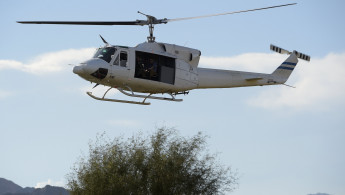Why did Raisi's helicopter crash and why did Iran need Turkey's help?
Speculation continues to surround the death on Sunday of the Iranian president and other top officials, particularly the helicopter which transported them.
Many people have raised questions over the type of aircraft that carried President Ebrahim Raisi and Iran’s foreign minister, Hossein Amir-Abdollahian, alongside other Iranian figures before it crashed in northwestern Iran.
The Bell 212
Amid shock and conflicting reports about the crash and who was on board the helicopter when it came down, attention was largely drawn to the type of chopper that was carrying some of the country's leading political figures.
The Bell 212 is a US-made dual-engine, dual bladed helicopter, 17 metres wide and three metres high. It can fly up to 260 kilometres per hour for 980 kilometres, accommodating up to 14 passengers. It first flew in 1968.
Experts had pointed out that the antiquated Bell 212 was built to fly in conditions where the pilot had a clear view of the terrain from their seat. But images which started coming out of Iran on Sunday showed the poor weather conditions, with thick fog engulfing the area.
Two other helicopters which were part of the three-copter aerial convoy landed safely, Iranian officials said.
The Iranian government had purchased a number of these helicopters from the US before the 1979 Islamic Revolution. The country has an aging fleet in continued deterioration, unable to purchase new planes due to crushing US sanctions, forcing it to carry out upgrades on existing ones.
Turkish intervention
The crash happened amid thick fog and with darkness approaching. With a lack of equipment needed in such challenging circumstances and no signs that local search teams could allocate the crashed helicopter, various countries offered to help.
Neighbouring Turkey intervened, sending a drone to assist the Iranian teams in finding Raisi and his companions. The Turkish Akinci drone was sent to the mountainous region of Iran’s East Azerbaijan province to partake in the operation.
The Bayraktar Akinci is a high-altitude, long-endurance, unmanned combat aerial vehicle manufactured by Turkey’s Baykar company, capable of operating in tough weather conditions.
The Turkish defence ministry said an Akinci UAV and a night vision Cougar type helicopter were dispatched to participate in the search and rescue mission following a request by Iranian authorities.
BREAKING — Turkey’s Bayraktar Akinci drone detected a heat source, which is thought to be the wreckage of the helicopter carrying the Iranian President Raisi, and shared its coordinates with the Iranian authorities, Anadolu reports pic.twitter.com/HqI77lH8UM
— Ragıp Soylu (@ragipsoylu) May 20, 2024
As people around the world waited for updates on Raisi and confirmation on whether he was dead or alive, many spectators became interested in the Turkish drone mission, managing to livestream its footage as it hovered for seven hours over the area where the helicopter was said to have crashed.
It eventually detected a source of heat on Monday morning in the steep terrain, and identified the bodies of Raisi, Abdollahian, and those on board the downed helicopter.
Sunday’s national emergency has exposed what seems to be the limited aerial capabilities of Iran, a country which frequently parades its missiles and threatens to use them against external threats like Israel.
After finding the wreckage of the crashed helicopter of Iranian President Raisi, Turkish Bayraktar AKINCI UAV returned home & drew the star and the crescent (Turkish flag 🇹🇷) on FR24. pic.twitter.com/BsNTgdGAwj
— Clash Report (@clashreport) May 20, 2024
Drawing the national symbol
Upon finishing its mission, the Akinci drone headed back to Turkey.
An image which has been widely shared online seemingly shows the drone drawing the crescent moon and star – the symbol seen on the Turkish flag – over Lake Van in Turkey’s east.
As well as boasting one of the strongest militaries in the region, Turkey has quickly become a world competitor in its export of nationally manufactured drones, namely the Bayraktar TB2 combat drones which have been used in numerous conflicts including with devastating effect during in the Ukraine war.





 Follow the Middle East's top stories in English at The New Arab on Google News
Follow the Middle East's top stories in English at The New Arab on Google News


